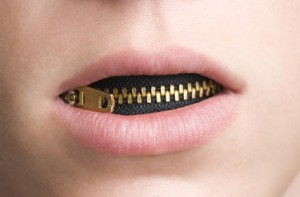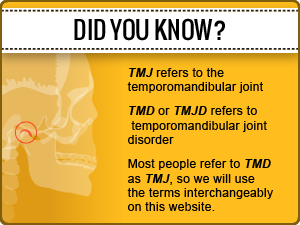TMJ Speech
Struggling with a TMJ related speech disorder?A TMJ speech disorder can be more than a mouthful
 TMJ disorder, often abbreviated as TMD or sometimes just TMJ, is arguably one of the most misunderstood disorders in medicine. The two temporomandibular joints we have are responsible for all jaw and mouth movements.
TMJ disorder, often abbreviated as TMD or sometimes just TMJ, is arguably one of the most misunderstood disorders in medicine. The two temporomandibular joints we have are responsible for all jaw and mouth movements.
Considering how much work these joints have to do, it is not surprising that many people, about 35 million, suffer from some type of TMJ symptoms at one time or another. TMJ can cause pain in your head, neck, eyes, ears or throat.
TMJ can also affect:
TMJ is related to health issues ranging from sleep apnea to poor posture, and dealing with TMJ symptoms can be frustrating. When TMJ causes speech problems, it can be embarrassing and affect everything from your job to your relationships.
Do I have TMJ Disorder?
Symptoms include migraines, neck pain, jaw pain, lower back pain, snoring, sleep apnea. Use our Free TMJ Disorder Assessment ToolsGive me a break!
Speaking is one of the primary actions that engages the temporomandibular joints. The TMJ lies between the skull and the jaw. It allows your jaws to open and close and move from side to side. The TMJ gets a workout throughout the day and even when we sleep.Think of all the things we do that require our jaws: speaking, eating, yawning. Even while asleep, we may breath through our mouth, snore or grind our teeth. The single most important function is keeping our airway open.
Your TMJ rarely gets a rest. From the time you are born, our TM joints work to allow smooth jaw movement without pain. As the years go by, there is a very good chance that something will go wrong with one or both of the joints, which leads to less smooth jaw movement and very often, pain.
A slippery slope
TMJ problems can be the result of an accident or a blow to the face or head, but very often, people experience TMJ symptoms when nothing out of the ordinary has happened. TMJ problems can happen from simply living and using your jaw normally. The disk that cushions the joints can become displaced or eroded, leaving the joints without shock absorption and protection. A TMJ problem can occur in only one of the joints, or both. Even if only one joint has a problem the function has changed in both. Each TMJoint affects the other during function.
If you start experiencing minor TMJ symptoms, such as slight pain when you chew, you will probably, without realizing it, start to move your jaws in a different way to alleviate the discomfort. This abnormal jaw movement only leads to more problems. The first problems are usually inside the TMJoints (internal derangements) or in the muscles and fascia surrounding the joint (myofascial pain and dysfunction).
Speak up would you?
 When TMJ becomes more serious, it can have a noticeable effect on your speech. This may be because you have become accustomed to moving your mouth differently than you used to, and you may find that your voice sounds different, that you have slurred speech or that you produce more or less saliva than usual when you speak.
When TMJ becomes more serious, it can have a noticeable effect on your speech. This may be because you have become accustomed to moving your mouth differently than you used to, and you may find that your voice sounds different, that you have slurred speech or that you produce more or less saliva than usual when you speak.
TMJ can also affect your teeth, which in turn, can affect your speech. TMJ can affect your voice indirectly by causing various problems in your mouth and jaws. An unusual but horrible TMJ problem is a medial disc displacement that impinges on the Trigeminal Nerve as it exits the brain through the foramen oval. Patients unfortunate enough to have this problem speak without moving their jaw at all to avoid intense pain.
Find your voice
TMJ symptoms can be masked with pain relievers, and, for many people, jaw exercises, relaxation techniques or breathing exercises can help. But, if your TMJ is caused by a fundamental or structural problem with your teeth, or jaws, physiologic TMJ treatment will probably be needed to address the cause of the problem. Tackling the symptoms won’t bring long lasting relief.
Dr Shapira takes a three pronged approach to treating TMJ disorders:
Phase 1
Dr. Shapira brings physiological health back to your jaw through jaw relaxation, physical or manual therapy and the use of a Diagnostic Physiologic Orthotic to allow healing. Ideally during Phase 1 all or most of the pain is eliminated or managed and the muscles and joints are allowed to heal to a physiologically healthy state.
Phase 2
Is all about stabilization, stopping the problem from reoccurring giving you long term relief. Treatments at this stage reshapes your bite through long term orthotics or orthodontics, or repairs or replaces missing or damaged teeth through dental restorations or what’s know as a smile rejuvenation. There’s often a bonus to this phase – better looking teeth and a great smile. Patients often look younger and healthier after reconstruction, long term orthotics or Epigenetic Orthodontics with the DNA Appliance.
Phase 3
Is the step we aim to avoid. This is the most invasive phase and is only necessary in the most difficult cases. Injections, surgery or what we call anti-aging dentistry are the treatments provided in this phase. Dr Shapira believes in avoiding invasive joint therapy whenever possible.
Where will your treatment take you? Come in for a consultation and find out.


I have issues when I eat sometimes I feel pain in my jaw for some seconds, and one of my tooth is leaning forward (second premolar) I alway feel uncomfortable in that area.
Pain related to eating may be econdary to decay, pulpal issues or myofascial pain. More information would be helpful.
Hello, it has now come to the stage where talking causes
Pain, so tmj has now disrupted my ability to be vocal what can i do
It is definitely time to get treatment to allow you to function normally.
Visit my youtube page for patient testimonials: https://www.youtube.com/channel/UCk9Bfz6pklC7_UluWFHzLrg
Have your doctor send referral:
https://thinkbetterlife.com/referrals/
https://thinkbetterlife.com/wp-content/uploads/Referral-Form.pdf
I have difficulty saying s and l like slug, i was told it could be weak muscles in the throat, due to radiotherapy. But you now say it could be tmj.which i have as well due to grinding teeth.?
There are many problems related to TMD, MPD and trigeminal disorders. There may be many issues that can be addressed but there is not enough information in an e-mail to assess this. TMJ diorders are called “THE GREAT IMPOSTER” because they often have symptoms that don’t relate directly to the jaws.
Please contact my office to set up a consultation appointment.
TMJ has made my life miserable for many years , it has effected me in many ways to the point where i have speech problems and my teeth never meet comfortably. consulted many dentist and experts but nothing benefited me. i wonder if there is any cure for this in this planet
I Hate the word “CURE” but it is possible to improve your quality of life moving forward. Only a do-over on all the years you lived with pain would be a cure and that is not possible. Your life and your nervous system has changed in many ways due to living with pain. Reducing and eliminating the pain is the first step to getting you back on track.
Your body has tremendous ability to heal but there are reasons that this is prevented. Please visit my youtube channel to hear patient’sstories:
https://www.youtube.com/channel/UCk9Bfz6pklC7_UluWFHzLrg/videos
Hi been to dentist and he thinks my tmj problem is more of a muscular problem. Yet it affects my speech can tmj do this with a muscular problem. I can feel it pulling on my jaw muscles when i talk and its very tender too. Any suggestions what i can do
All TMD is to a large part muscular and some patients do not have internal derangements of the joints initially. TMD creates a wide spread of orofacial pain symptoms. The nature of the relationship of teeth occluding and two TM Joints leads to repetitive strain injuries that have often been there for years before you become aware of symptoms. Deviate swallow, neck and back issues, forward head position all develop gradually.
I suggest starting with a consult and a diagnostic neuromuscular orthotic. The orthotic along with other treatment specifically directed toward you issues usually gives rapid relief to most symptoms often in just a couple of visits.
TMJ disorders that do not involve the joints are usually easier to treat because there is no permanent damage to the joints.
Can TMJ/D cause hoarseness and a sore throat? I’ve was recently diagnosed, but have been dealing with it for years. The hoarseness and vocal strain have been going on for about 2 or 3 months.
TMJ/D is often associated with sleep disordered breathing and sleep apnea. Reflux is also associated with sleep apnea. This can cause hoarseness and vocal strain. There are multiple myofascial referal patterns that cause throat pain. They may be associated with hoarseness. Some MPD referrals cause a feeling of something being stuck in the throat and others replicate throat pain.
Im learning I have TMJ many trips to the Er for a mnth of getting wrong answers and being in really bad face pain and head that it hurt so bad to make u think its a emergcy.well went to ENT. For $260to be told that no I had no fluid in my middle ears and had no sinus problems of any kind that its TMJ.its been a battle dealing with it daily some days are easier feel as if its getting better and try and it someyhing not mushy then next thing you kno im hurting hours later im lost and like when will things get back to normal dont have insurance to go to doctor so I try and do TMJ massages a d excrises at home..they help some.please help me
If you can and idea s thanks
Self Administered SPG Blocks are amazing at eliminating pain and other symptoms. A diagnostic neuromuscular orthotic is generally the first step of treatment. Insurance is sometimes useful but not always.
I’ve been getting pain in my jaw for the last 5 years. I was told it was tmj and the maxilo facial doctor put me on lots of pain killers for the next 3 years and a mouth guard. And then he seen my left jaw bone is smaller than the right side which is causing pain. But hasn’t done anything about it. What would be best to do In this situation. I get alot of pain and slurred speech or difficulty speaking and eating.
I would suggest you look into an neuromuscular dentist and a diagnostic neuromuscular orthotic. There are multiple patient videos at https://www.reddit.com/r/NeuroMuscularDent/
These are patients I have treated.